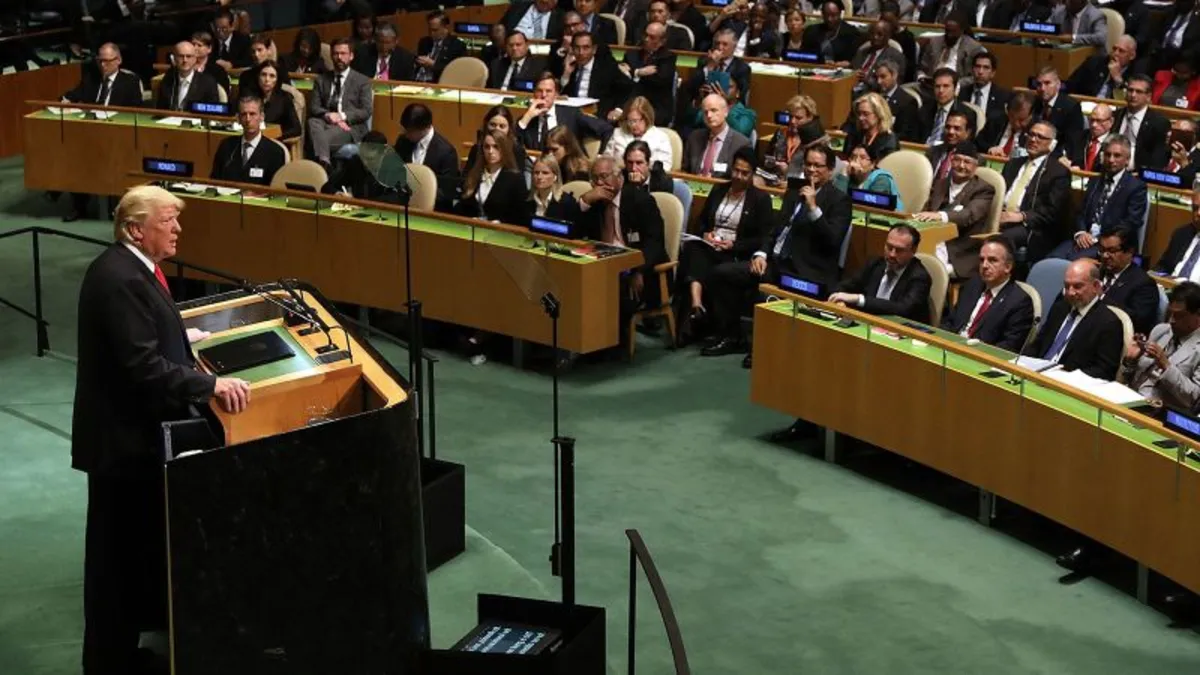
When President Donald Trump first addressed the United Nations during his initial term, he was met with a response that was both unexpected and jarring: mocking laughter from the assembly. Fast forward seven years, and the prospect of such a scene repeating itself seems implausible. Once a figure of skepticism and ridicule among international leaders, Trump now arrives at the UN General Assembly (UNGA) as a pivotal figure in a shifting world order that increasingly finds little value in traditional global institutions.
Instead of facing laughter, Trump is now the recipient of elaborate displays of flattery from world leaders eager to win his favor. No longer a newcomer to the complexities of multilateral diplomacy, Trump is recognized as a president who has fundamentally altered global frameworks concerning trade and security. This transformation has come at the expense of the post-World War II international system that previous administrations sought to uphold. As the narrative around his administration continues to unfold, the successes and failures of his strategy remain in question.
Two significant conflicts that Trump once vowed to resolve swiftly—those in Gaza and Ukraine—continue to persist. His strategy of moving away from collective international approaches and instead cultivating personal relationships with leaders like Israel's Prime Minister and Russia's President has yet to yield meaningful progress. Following his speech on Tuesday, Trump is scheduled to meet with key foreign leaders, including Ukrainian President Volodymyr Zelensky, whom Trump recently urged to pursue peace negotiations with Russia.
Trump frequently highlights his attempts to broker peace in various global hotspots, including the long-standing conflict between Armenia and Azerbaijan, where he has received significant recognition. His involvement in negotiations between India and Pakistan remains contentious, but he is adamant that his efforts warrant a Nobel Peace Prize, asserting that he has succeeded where traditional diplomatic channels, including the UN, have faltered.
In his upcoming speech, Trump is expected to emphasize the efficacy of his approach in addressing shared global challenges such as migration and trade. His remarks will likely cast doubt on the effectiveness of the very institution he is addressing. According to press secretary Karoline Leavitt, “President Trump will deliver a major speech touting the renewal of American strength around the world, highlighting his historic accomplishments in just eight months.”
Historically, Trump has expressed disdain for the UN. Even before his presidency, he criticized the institution's aesthetics and was frustrated when his renovation proposals for the General Assembly building were dismissed. His complicated history with the UN includes a failed attempt to develop Trump World Tower, which was opposed by diplomats concerned about its impact on the UN's visual landscape.
During his presidency, Trump has significantly reduced U.S. financial contributions to the UN, ceasing payments toward its budget and cutting funding for foreign humanitarian aid and peacekeeping efforts. This has left the organization in a precarious financial state. Trump has articulated his belief that the UN has "tremendous potential" but is failing to realize it, a sentiment he reinforced when the U.S. withdrew from the UN Human Rights Council earlier this year.
Trump's administration has taken stances that often align with adversaries rather than allies in critical UN Security Council votes. For example, in February, the U.S. joined forces with Russia and China to support a resolution on Ukraine that did not hold Moscow accountable for the ongoing conflict. Furthermore, Trump's position on the Israel-Gaza conflict has left him at odds with numerous member nations, including key allies.
On Tuesday, Trump plans to engage with leaders from various Muslim-majority nations, including Qatar, Saudi Arabia, Indonesia, and others, to discuss the ongoing Gaza conflict. His administration has consistently criticized the UN as being hostile to Israel and has raised concerns about its operational effectiveness.
Despite the ongoing controversies, Trump’s influence on international affairs is undeniable, and he is set to meet with key figures, including European Commission President Ursula von der Leyen and UN Secretary-General António Guterres, during the UNGA. As he prepares for his address, it remains to be seen how Trump will navigate the complex landscape of global diplomacy and what lasting impact his administration will have on the UN and international relations.
Trump's speeches at the UN have varied from the dry recitations of policy to moments of trademark bravado, such as his infamous "rocket man" reference to North Korea's Kim Jong Un. The mocking laughter from his first address is a stark contrast to the current atmosphere, where world leaders now seek to engage with him on more favorable terms. The evolution of Trump's diplomacy illustrates the shifting paradigms in global governance and the complexities of international relations in an increasingly polarized world.